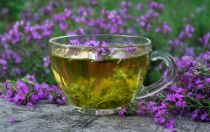Thyme, or Banajwain as it is called in India, is native to the northern shores of the Mediterranean, though it grows in Asia as well. Thyme is not a single plant species, though, and refers to all the species of the genus Thymus of the mint family. There are around 350 plants in the family, and all of them are aromatic.

We usually associate Thyme with cooking, as we commonly use it as a flavoring for soups, salad, sauces, pickles, etc. But Thyme is much more than a flavoring agent and has a host of health benefits recognized in Ayurveda. Thyme has been used in the Middle East for thousands of years as an antibacterial agent and digestive. The herb is rich in vitamins and minerals. It contains Calcium, Iron, Manganese, Magnesium, Potassium, Selenium, Vitamin A, Vitamin K, Vitamin E, and Vitamin C. Even today. Thyme tea is popular in cafes in Iran, where people drink it for sore throats, breathing issues, etc.
Here are some of the most common health benefits of Thyme:
The five procedures are:
For Respiratory Issues

Thyme is a natural expectorant, and thyme tea can ease cough and nasal congestion by thinning the mucus. It also helps cure all kinds of respiratory ailments like bronchitis because of its antiseptic and antimicrobial properties. You can make Thyme tea easily by adding a few teaspoons of Thyme into boiling water. Let it sit for a few minutes and strain like regular tea.
For Bone Health
Being a rich source of vitamin K, iron, calcium, and manganese, Thyme can boost the health of the bones. Regular consumption is also said to prevent diseases like osteoporosis and anaemia. It is also believed that the terpenoids in Thyme can prevent cancer.
As Essential Oil
As Thyme has a good percentage of thymol, it is widely used as an essential oil to cleanse the skin. Thyme oil was used for medicated bandages for its antibacterial and anti-inflammatory properties and is still used for mouthwashes.
Aids Digestion
The volatile oils in Thyme can improve your digestion and prevent the growth of intestinal bacteria. Chewing Thyme after food can arrest chronic gastritis, irritable bowel syndrome and improve gut health in general. Consuming Thyme is believed to help with diarrhea and colic.
Controls Blood Pressure
The rosmarinic acid present in Thyme has been linked to increased blood flow and a consequential controlling of blood pressure.
Boosts Mood

It might seem no surprise that an aromatic herb can be stress-relieving, but Thyme has anxiety-reducing properties. Europeans used to place a sprig of Thyme under the pillow for a good night’s sleep. This is because the Vitamin B6 present in it can boost the production of serotonin. Thyme tea is recommended for migraines and menstrual pains.
How to Use Thyme
Besides thyme tea, Thyme can be consumed as syrup or inhaled as steam for respiratory issues.

Thyme is considered safe when used in small quantities in cooking, but in large quantities, it may stimulate the uterus, and hence it’s not advised for pregnant women to use it.
It is said that diffusing thyme essential oil elevates the mood by enhancing dopamine and serotonin for cough, insomnia, and anxiety diffuse about 5 drops of Thyme essential oil. Mix 2–3 drops of Thyme essential oil with a half teaspoon of coconut oil and apply topically to nose, neck, chest, and feet. But, you should not take thyme essential oil internally without proper dilution. Excessive use of pure essential oil is toxic and can cause mild to significant health hazards. Even for external application, use a diluted form to avoid skin irritation.
Thyme is used to treat fibroids and PMS symptoms, too. It’s often recommended to rub two drops of Thyme oil on the abdomen twice daily.



